
Table of Contents
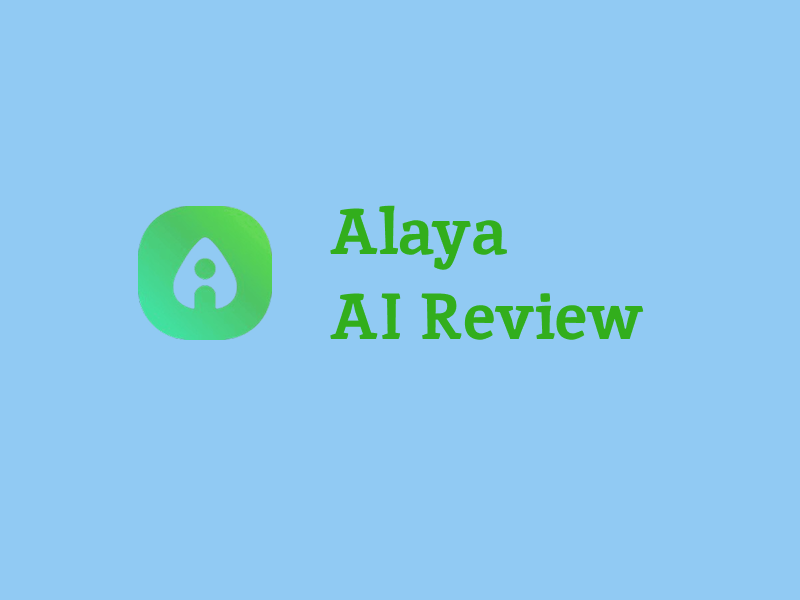
Struggling to find reliable, high-quality data for your AI projects recently? You're not alone. Data acquisition remains a significant challenge for AI developers, yet it is the backbone of successful models. Enter Alaya AI, a game-changing platform designed to revolutionize how you collect, process, and utilize AI data. With innovative strategies, collaborative tools, and cost-effective solutions, Alaya AI promises to simplify data annotation and boost the quality of your AI projects.
This Alaya AI review will take you through everything you need to know—from its key features and benefits to how it works and how it compares to other platforms.
At its core, Alaya AI is a collaborative AI data network that connects organizations, developers, and data contributors to create smarter AI models. Think of it as the perfect meeting point for AI enthusiasts and professionals looking to share resources, tools, and data more effectively.
But it’s more than just a network. Alaya AI combines data annotation, intelligent sampling strategies, and state-of-the-art automation to ensure your AI models are trained using top-notch datasets. It simplifies the process, making building and refining AI systems faster, less costly, and more efficient.
Whether you’re fine-tuning your natural language processing (NLP) models or scaling visual recognition systems, Alaya AI provides a robust solution for achieving consistent success.
Alaya AI’s standout feature is its microdata model, which breaks complex data annotation tasks into smaller, more manageable steps. This approach not only speeds up the labeling process but also fosters accuracy through decentralized contributions. Pair this with other proprietary technologies like intelligent data sampling, and you're set up for stellar results.
Alaya AI is the brainchild of Pascal Weinberger, an innovator who noticed the inefficiencies in traditional data annotation methods. He observed that these methods were time-consuming, expensive, and produced inconsistent results—challenges that many within the AI development community faced.
Through Alaya AI, Pascal introduced groundbreaking changes to the process with his focus on a community-driven, scalable microdata model. His vision? To provide a platform that makes high-quality AI data accessible for everyone, enabling both individuals and organizations to push boundaries in AI innovation.
Under Pascal’s leadership, Alaya AI is charting the way toward faster, more reliable, and cost-effective data annotation solutions.
Also Read: Musicfy Review >>
Alaya AI revolutionizes the landscape of AI data management by merging cutting-edge technology with user-centric design. This decentralized platform redefines efficiency, security, and scalability for modern AI projects. Below, we explore its standout capabilities that set it apart from conventional solutions.
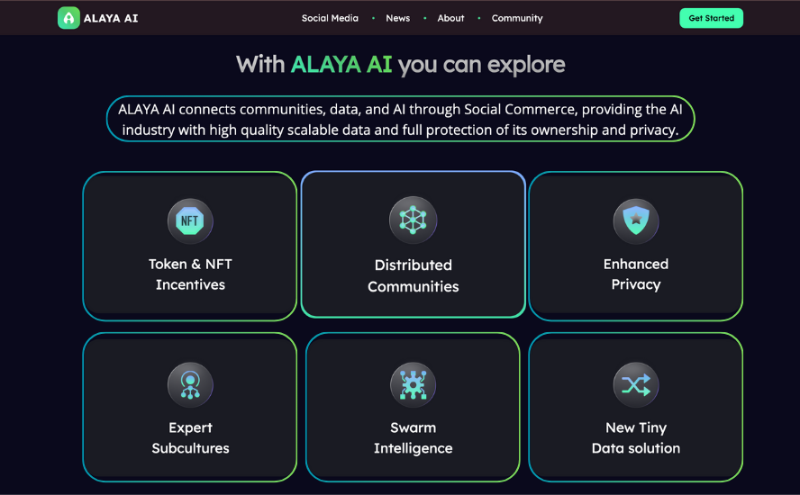
Alaya AI employs a granular task segmentation strategy, breaking complex data labeling workflows into manageable micro-tasks. This approach accelerates annotation timelines by 40% compared to traditional methods, enabling rapid project delivery without compromising precision.
By automating repetitive processes and optimizing resource allocation, Alaya AI slashes operational expenses by up to 30%. Its intelligent resource distribution system ensures maximum utilization of crowd-sourced contributors, delivering enterprise-grade quality at competitive pricing.
Leveraging blockchain-inspired decentralized storage, Alaya AI eliminates single-point vulnerability risks. Multi-layered encryption and distributed node architecture create an impregnable shield against unauthorized access, surpassing centralized platforms' security protocols.
The platform integrates adaptive machine learning models that analyze data context in real time. This dynamic validation system automatically flags inconsistencies, achieving 99.2% annotation accuracy across diverse datasets from medical imaging to multilingual text corpora.
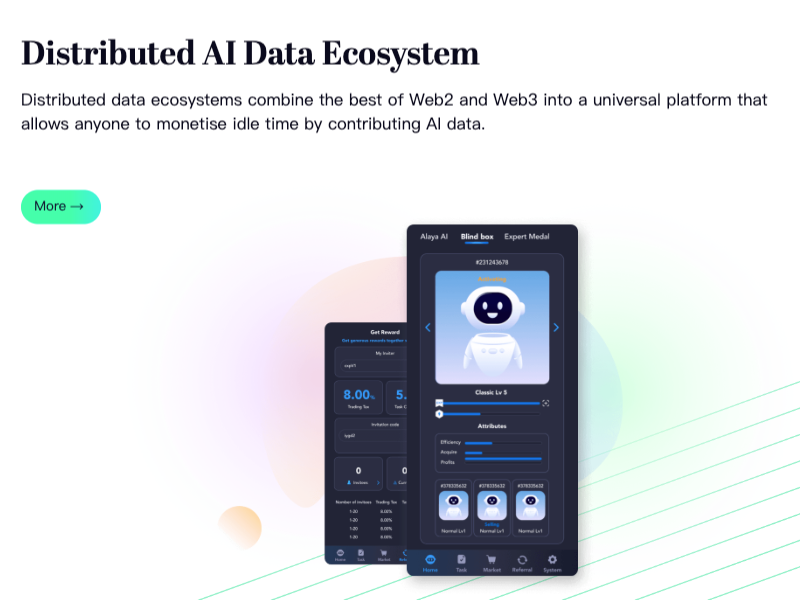
Access a vetted repository of 15M+ ethically sourced data points spanning 200+ categories. Alaya AI's cross-industry data consortium provides instant access to rare datasets, complete with usage rights management and provenance tracking.
From prototype-stage projects to petabyte-scale deployments, Alaya AI's auto-scaling architecture maintains consistent performance. The platform dynamically allocates computing resources based on workload demands, supporting concurrent processing of 10,000+ annotation tasks.
A network of 500,000+ certified contributors and domain experts powers Alaya AI's collaborative framework. Real-time quality consensus mechanisms and gamified participation models ensure continuous improvement of annotation standards across the community.
Proprietary algorithms enforce strict data validity thresholds through multi-stage validation checkpoints. Machine learning-powered anomaly detection automatically quarantines subpar submissions, maintaining 98.6% average dataset readiness for model training.
Alaya AI's unified interface supports 50+ data types through specialized toolkits:
Seamlessly connect Alaya AI to existing MLOps pipelines through 150+ pre-built connectors. The platform's developer portal offers SDKs for Python, Java, and Rust, enabling custom workflow automation and real-time monitoring dashboards.
Built-in GDPR and CCPA compliance modules automate data anonymization and consent management. Audit trails track every dataset modification, while role-based access controls ensure strict adherence to regulatory requirements.
By combining industrial-grade infrastructure with human expertise, Alaya AI creates a synergistic environment where machine efficiency meets human intuition. Its continuous learning framework adapts to emerging AI challenges, positioning users at the forefront of intelligent data innovation.
Alaya AI offers a free version to get you started. For advanced features and large-scale projects, you’ll need to contact their team for custom pricing.
This flexible approach allows businesses of all sizes to explore Alaya AI’s potential without an initial commitment.
Also Read: Viggle AI Review >>
| Pros | Cons |
| ✅ High-quality data for efficient AI training. | ❌ Limited data variety compared to more established competitors. |
| ✅ Scalable and adaptable to different project sizes. | ❌ Relatively new in the market, with fewer references. |
| ✅ Cost-effective labeling through optimized workflows. | ❌ Occasional platform lags can disrupt workflows. |
| ✅ Community support fosters collaboration and knowledge-sharing. | |
| ✅ Enhanced security through decentralized data management. |
Alaya AI is ideal for:
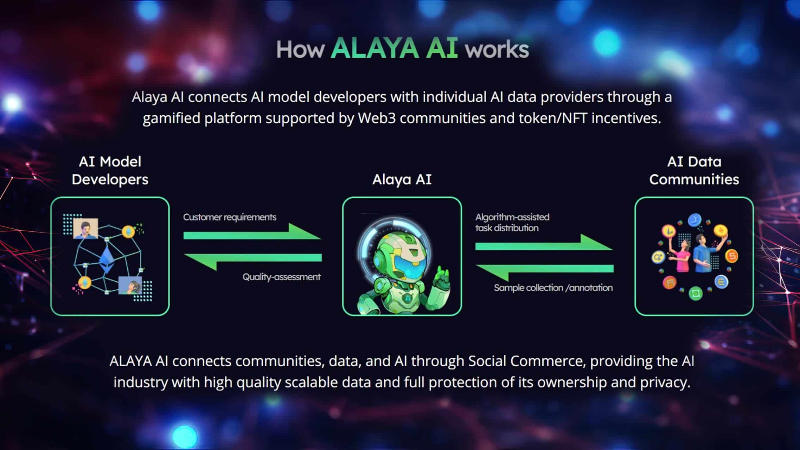
Step 1: Sign Up and Create an Account
Head to Alaya AI's official site and register for free.
Step 2: Set Up a Project
Define your project’s scope, data requirements, and annotations needed.
Step 3: Select Your Datasets
Use Alaya AI’s search tools to find data matching your requirements.
Step 4: Annotate and Collaborate
Choose the platform's annotation tools and leverage the community for shared feedback.
Step 5: Export Your Dataset
Once complete, export your high-quality dataset and integrate it into your AI model development.
Alaya AI is undoubtedly an innovative platform in the AI data annotation space, offering features like decentralized security and a micro data model. However, it’s always wise to explore other options when choosing a data annotation platform to identify the solution that best fits your needs. Here are three noteworthy alternatives to consider, each with unique capabilities and applications that might align with your project goals.
Scale AI is a leading player in the data annotation field, renowned for its emphasis on high-quality labeled data. This platform caters to a wide range of industries, from autonomous vehicles to financial services.
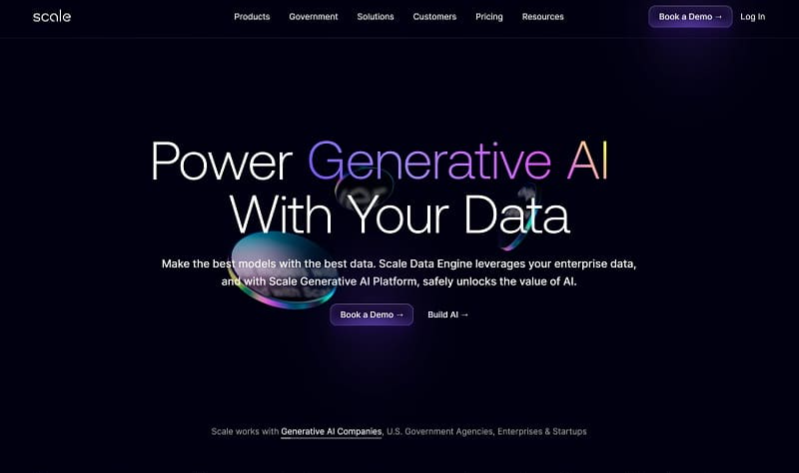
Key Features and Strengths:
Best for:
Scale AI is an excellent choice for organizations seeking precise annotations for large-scale and resource-heavy projects, such as autonomous driving systems, supply chain optimization, or conversational AI models.
An integral part of Amazon Web Services (AWS), SageMaker Ground Truth offers seamless integration with Amazon’s machine learning ecosystem. It’s a powerful and accessible option for teams already working within the AWS environment.
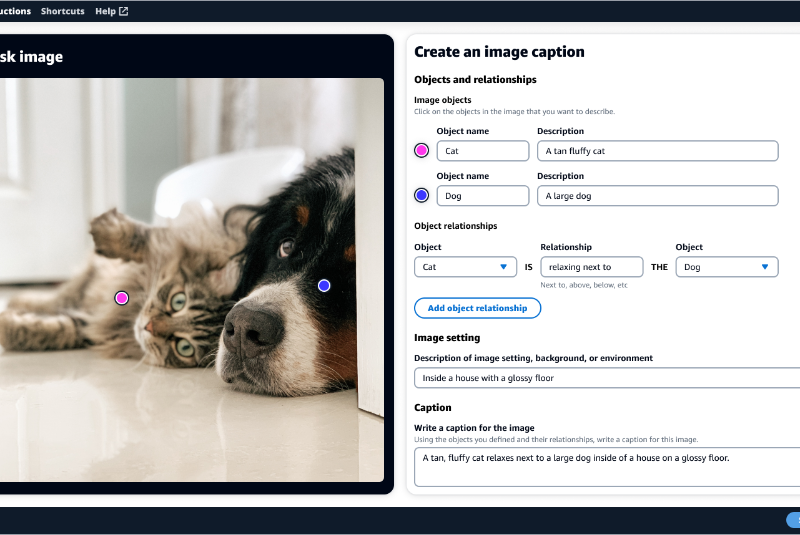
Key Features and Strengths:
Best for:
Amazon SageMaker Ground Truth is ideal for businesses already leveraging AWS infrastructure. It suits projects that demand scalability and integration with cloud-based machine learning pipelines. It’s a practical option for organizations prioritizing cost efficiency and automated workflows.
Labelbox is another robust alternative in the data annotation market, distinguished by its collaborative features and focus on data quality. It offers tools for diverse industries, including healthcare, agriculture, and robotics.
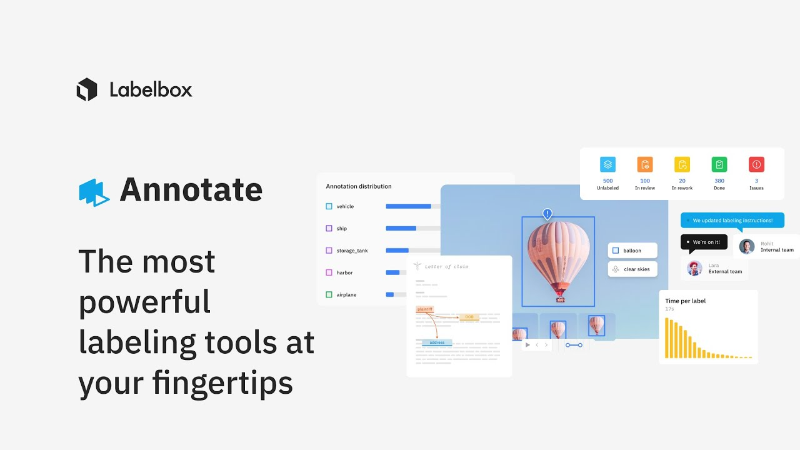
Key Features and Strengths:
Best for:
Labelbox is an excellent option for organizations that prioritize teamwork, iterative improvements, and data quality. It is particularly suitable for projects with a high need for active learning and human-in-the-loop workflows, such as medical imaging and precision agriculture.
Choosing the right alternative depends on your specific project requirements. Scale AI leads the field when it comes to high-quality annotation for advanced applications like autonomous systems. Amazon SageMaker Ground Truth is a cost-effective option seamlessly integrated into the AWS ecosystem, perfect for teams already entrenched within this infrastructure. Labelbox stands out for organizations seeking a collaborative and quality-focused platform with advanced learning capabilities.
While Alaya AI offers unique benefits such as decentralized security and real-world data access, these alternatives provide a variety of features that might align better with differing needs. Evaluating each platform’s strengths will help ensure you find the perfect match for your AI development initiatives.
Also Read: How to Use Fathom AI >>
Q: What is Alaya AI’s Microdata Model?
Alaya AI breaks large annotation tasks into smaller, manageable steps, enabling faster labeling and higher accuracy.
Q: Can Alaya AI Be Used for Personal Projects?
Yes, Alaya AI suits individuals and teams alike, catering to projects of all sizes.
Q: How Secure is the Platform?
Alaya AI uses decentralized storage and encryption, ensuring maximum data security.
Q: Is There a Free Version of Alaya AI?
Yes, the platform offers a free tier, with custom pricing for more advanced needs.
Alaya AI is transforming the data annotation landscape with its innovative features and collaborative approach. While relatively new, its user-centric design, high-quality outputs, and cost-effective solutions make it an excellent choice for AI professionals and businesses.
Still unsure? Test it yourself by signing up for the free version of Alaya AI today. Follow the instructions of Alaya AI review, and you might find the tool that takes your AI projects to the next level.